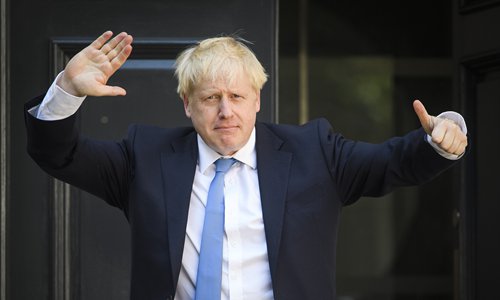HOME >> OPINION
Will Boris Johnson be the one to end the perilous Brexit theater?
By Wang Xiaoguang Source:Global Times Published: 2019/8/8 20:41:19

Photo: IC
With Theresa May's exit and Boris Johnson as the new British prime minister, a genuine Brexiteer is in the driver's seat for driving Brexit policy and UK politics.
During May's term, the dilemma was how there wasn't policy space to create a deal with the EU between the current EU members and the Brexiteers' appeal of a number of issues including immigration restrictions.
With today's EU framework and regulations, the result of the UK's 2016 EU membership referendum would have been nothing but a hard Brexit or no-deal Brexit.
The mission of creating such a deal exhausted the time and energy of May's government. Her strategy pleased neither side and resulted in her political demise.
Now, it's time for Johnson, a hard-core Brexit supporter, to take the responsibility. Perhaps he is the right man to end this Brexit theater.
The grey zone in Brexit negotiations has been minimized by Johnson's stance, even though negotiations remain a thorny issue for him.
With his premiership, the no-deal option looms large and provides Brexiteers with an emotional and political outlet, and maybe another short cut to end the tediously long Brexit theater.
The EU cannot win more in further negotiations with Johnson than it already achieved with May. A UK-EU showdown is approaching. Johnson has to create a consensus in the House of Commons, where the Labour Party remains opposed to the no-deal option, and Johnson's relations with the Eurosceptic faction is worth noticing.
A hard or soft Brexit is not the only question Johnson must answer. Maintaining the UK's economic growth and competitiveness should be the more important tasks for his cabinet.
In the past, the high-profile Brexit debate overshadowed the problems of British society, such as the gap between the rich and the poor, housing issue, tax, public services and social security. Solving these problems in the backdrop of Brexit will be challenging.
The risks no-deal Brexit brings, especially the brain-drain, the fraught bid to leave the single European market, the potential challenges in UK's modern services and manufacturing sector, are pressing. Moreover, the fluctuating value of the sterling, which is a direct result of Brexit, could be fatal to the business of the City of London. With Johnson coming to power, these post-Brexit issues could be more realistic for UK's economy.
UK's relations with the US are another key issue for the New York-born "Britain Trump," to ensure success during the Brexit and post-Brexit periods. Boosting transatlantic relations would alleviate Brexit aftershocks in the UK.
But a closer US-UK relationship may increase the risk of pulling the UK closer to US-centered controversies on the world stage.
Regardless of the results, people can anticipate Johnson to end the Brexit theater, which has lasted over three years. Of course, what happens to the UK, Europe, and the world, after Bexit, will be for the world to see.
The author is lecturer of international political economy at China University of Petroleum in Beijing and adjunct fellow at Center for China-EU Relations, Tsinghua University. opinion@globaltimes.com.cn
Posted in: VIEWPOINT